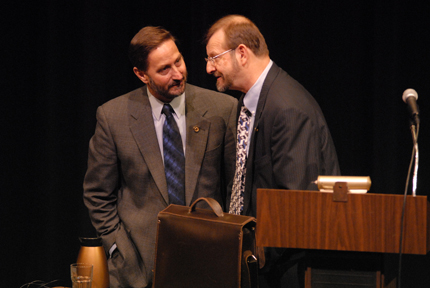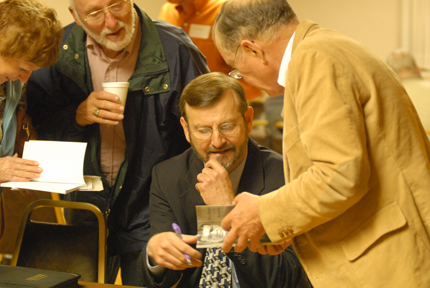UW-RF Home > University Communications Home > This Month's News Releases
University Communications
For more information contact mark.a.kinders@uwrf.edu or brenda.k.bredahl@uwrf.edu.
Historian Shares Leadership Lessons from Harrowing Antarctic Expedition
 APRIL 28, 2006--In an animated, theatrical presentation at the Phipps
Center for the Arts in Hudson April 27, historian and Antarctic expert
T.H. Baughman made leadership lessons come alive from Sir Ernest Shackelton’s
perilous 1914-17 expedition to the south polar regions.
APRIL 28, 2006--In an animated, theatrical presentation at the Phipps
Center for the Arts in Hudson April 27, historian and Antarctic expert
T.H. Baughman made leadership lessons come alive from Sir Ernest Shackelton’s
perilous 1914-17 expedition to the south polar regions.
While the voyage was cut short because his ship was frozen in and later
crushed by the shifting ice of the Weddell Sea, Shackelton’s leadership
and human acumen saved the lives of the entire crew, which was stranded
for more than 500 days in the vast icy reaches of the Antarctic continent.
Shackelton abandoned his lifelong expedition goals and dreams, but not
his crew. Using three small lifeboats from his ship, aptly titled “Endurance,”
they made their way to Elephant Island. With scant supplies, crew journals,
a banjo and the 23rd Psalm torn from a Bible left behind, Shackelton then
led a smaller crew on one boat through nearly 800 miles of the Southern
Ocean and the wicked Drake Passage to South Georgia Island where he knew
whaling stations would mean certain rescue.
Along the way, peril after peril such as a hurricane and currents leading
them off course challenged his unwavering leadership, including a terrifying
“human toboggan” ride down a mountain. When they finally arrived
on the inhabited side of South Georgian Island, the filthy leader and
his crew were unrecognizable by the head of the island’s whaling
industry, who had dined with them in inaugural celebration more than a
year before. Four attempts later, he saved his entire crew, a few on the
remote side of South Georgian Island and the remainder left stranded on
Elephant Island.
Shackelton was a renaissance man of sorts, successful at all of his many
endeavors. Professor Baughman, who teaches history at the University of
Central Oklahoma, noted that he was even more determined to lead after
he was said to be unfit for duty after an illness on a prior expedition
under fellow explorer Robert F. Scott. But he persevered, Baughman said.
“I guess I’m fit for nothing but exploring,” Shackelton
wrote in despair to a friend.
“A leader has to know to play on his strengths but not beyond them,”
Baughman said. “A leader never loses sight of responsibility.”
Shackelton used various techniques to shore up the morale of his crew,
even when they were stranded on an ice flow for more than two months.
He rewarded them with extra food, held a Christmas celebration months
early, and kept personal council with each and every member. Every day,
Baughman said, Shackelton had to make decisions regarding life and death.
“As the situation becomes more demanding, Shackelton’s focus
gets sharper.”
Baughman was invited to speak by UW-River Falls Chancellor Don Betz, who
celebrated his inauguration into leadership of the western Wisconsin campus
of 6,000 students on April 28. Betz worked with Baughman, who for four
years was dean of the College of Arts and Sciences, at UCO.
“Being a dean temporarily ended his career as a scholar,”
quipped Betz in introducing him. “He’s hoping to recover.”
His theatrical lecturing style was refreshing as he moved into the Phipps
audience and approached members as if they were characters in the story.
“I really believe my freshman lectures are better,” Baughman
modestly said after the presentation. “I’m able to bring in
more content issues and be more spontaneous than from a set.”
Baughman has authored six books on Antarctic and European history, including
“Shackelton of the Antarctic.” He is a fellow of the Royal
Geographical Society and the Explorer’s Club as well as a member
of his local Sons of Norway.
Baughman’s involvement with south polar regions began in the 1973-74
Antarctic season when late noted glaciologist Ian M. Whillans invited
him to join a scientific expedition as the “token” humanist.
Subsequently Baughman has made more than 30 trips to Antarctica. He is
currently at work on a book about American involvement since 1948 on the
southernmost continent that is run by international agreement fostering
scientific and ecological tourism collaborations.
For his newest book, he is seeking accounts of people associated with
Antarctic involvement who served before 1985. He can be reached at tbaughman@ucok.edu.
“Antarctica is a great international experiment,” says Baughman.
“It holds lessons for today’s world.”
Antarctica is not so far from the minds of faculty and students at UW-River
Falls. Physics Professors James Madsen and Glenn Spiczak and their students
have a long and current involvement with the AMANDA (Antarctic Muon and
Neutrino Detector Array) IceCube Project with an international team of
academic institutions, scientists, engineers, and technicians on the massive
neutrino telescope at the South Pole.
-30-
Last updated: